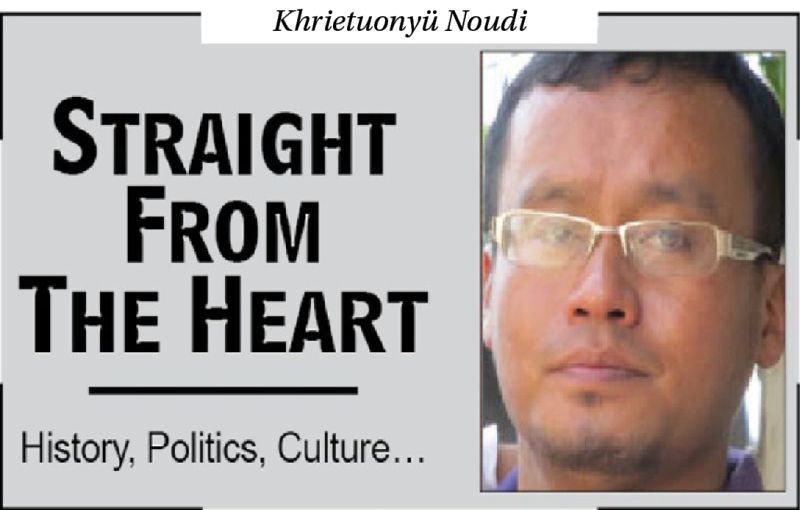
The recent protest spearheaded by the so-called Joint Coordination Committee (JCC) against unacceptable anomalies in the impending induction of non-SCS officers into the country’s most prestigious service (IAS) has once again shaken our conscience and brought to the fore how the Nagaland state government frequently takes steps that are not in congruence with logic, meritocracy and fairness.
The government may say that it is not doing anything new and that it is just doing what it has done numerous times in the past. But times have changed and with unemployment rampantly observable all around us, it is now pertinent that we cannot go on harping on old rules or precedents which were followed in the past when there was not much competition or frustration amongst job seekers and even amongst people who are already in service.
The IAS is undoubtedly the most prestigious service in the country and it is the dream job for millions of youngsters in the country. And from the start, it has been the intent of the country that only the most brilliant, the most efficient and the most capable persons should be in this service. That is why the UPSC conducts the most strenuous and toughest civil service exam every year to select and recruit only the best out of the best.
The UPSC Civil Service Exam is the toughest exam in the country and it is also considered one of the toughest exams in the world. Only people who are extremely disciplined, focused, committed and are willing to make extreme sacrifices are able to crack this exam. No wonder people who are recruited into the IAS are in a league of their own as they are showered with immense power and responsibilities right from the start of their careers and are also entitled to rapid promotions and as they jump like kangaroos from one department to another, their power, responsibilities and influences also increase manifold.
Our established system has also designed and instituted ways and means through which outstanding govt. servants who have exhibited extraordinary caliber and capabilities in their govt. career can be inducted into the IAS to give them more power and influence so that they contribute more to nation building and people’s welfare. Consequently, our state government has also inducted numerous capable non SCS officers into this prestigious service in the past. Thus, it is nothing abnormal if our state government is again intending to induct some more non-SCS officers into the IAS provided the shortlisted officers are capable ones with unblemished service records.
However, given the status of the IAS tag and the influence and power that an IAS officer would carry and wield, it is also logical that every Tom, Dick and Harry cannot be inducted into this prestigious service. The govt. needs to take extreme caution and take a microscopic view of all the applicants’ service records, relevant established rules, laws and precedents and also the changing needs and requirements of the times.
This time around, the JCC focused primarily on meritocracy and entry points of the shortlisted officers. The JCC justly argued that a person who did not enter service through competitive exam should not be considered for induction into the IAS. But I believe the matter should not stop there. What about those who entered service through competitive exams but, after their recruitment into govt. service, manipulated the system and got themselves promoted to gazzetted posts by hook or crook by sheer power of the political backing behind them thereby illegally surpassing other genuine candidates.
I believe that not only officers who entered service through recruiting agencies like the NPSC or the NSSB but also only people who have unblemished service records should be considered for induction into the country’s most prestigious service. There are strict rules, regulations and norms to be followed in every department when it comes to promotions and consideration of seniority for the employees. And so naturally, an officer to be shortlisted for induction into the IAS should not only be someone who entered service by clearing competitive exam but also someone who has not violated any rules or norms and who has not indulged in any malpractices throughout his career.
In the recent imbroglio of the Non-SCS officers’ induction, the advice of the UPSC was sought by the state government. But it is interesting to know that the UPSC put the ball back in the court of the state government to take a final call on the matter. This shows how powerful and omnipotent our state government really is, as it can literally and unilaterally debate and decide on most issues concerning our land and people.
But just because the state government has been vested with so much power and authority, it does not mean that those who are manning the affairs of our state should go to the extent of doing whatever it likes or favoring whoever it wants without taking into consideration the genuine rights, feelings and sentiments of all stakeholders.
The entry point of govt. servant is important but after a person enters service there are also many criteria through which it should be determined whether a govt. servant really deserves to be in the IAS. For instance, a person may get a clerical job fairly through a recruitment agency. But in our present established system, it would take at least a decade or more for a clerk to be promoted to a gazzetted post. And so when we talk about the eligibility of an officer for IAS induction, naturally not only his entry into service but also his elevation to a gazzetted post should be considered. This is so because the IAS Induction Rules clearly says that a person has to be in a gazzetted post for a minimum of eight years to be eligible for induction into the IAS. So naturally, how the officer got into the gazzetted post is also as important as how he entered govt. service.
So, the state government should reexamine the service records of all applicants and do not focus just on the entry point alone so that we will have the best and most deserving Naga officers looking after the affairs of our people.
To end on a personal note, let me also recite some of my personal experiences. After my graduation, I went to Delhi not just for my post graduation but also to find out whether I was destined to be in this country’s most elite service. I enrolled myself in a coaching institute in North Delhi area and stayed in a rented apartment.
My rented apartment was in a four storeyed building in which the landlord stayed in some parts of the first floor with his family. All the other rooms were rented out and all the tenants were civil service aspirants. There were about 25 tenants in the building and all of them had the IAS dream in their hearts. The coaching institute I attended was not far from the building.
So, living in this apartment surrounded by these civil service aspirants and interacting with them daily and observing their lifestyles and daily routines at close quarter, I know what it entails to prepare for this most exhausting competitive exam. Therefore I feel that it would be a grave and unpardonable injustice if any government is to parachute anybody into the IAS league without first having a thorough microscopic assessment of their service records and also their caliber and acumen.
Not only in Delhi, but even back home here in Nagaland, I have seen at close quarters how some of our Naga lads got into civil service making immense sacrifices and overcoming immense ridicules, distractions, sarcasm etc. All I can say is that it is not a joke to be in civil service after cracking exams conducted by recruiting agencies like the UPSC, NPSC etc. Therefore, the government of the day cannot just nullify all these sacrifices and accomplishments and select candidates out of their own whims and fancies just to please someone or just because of political pressure. At the end of the day, only people who sacrificed the prime of their youths to get into govt. service and who had adhered to all govt. rules and established laws throughout their service career should be considered for induction into the IAS.
We talk about the need to be “fair and square” in sporting events. We also talk about the need to be “fair and square” in assessing the performances of our students. And so when it comes to the recruitment or induction of officers into the country’s most elite service, it is absolutely necessary that the “fair and square” policy is followed so that we get only the best and the cleanest to serve our people and not people with shady service records.




